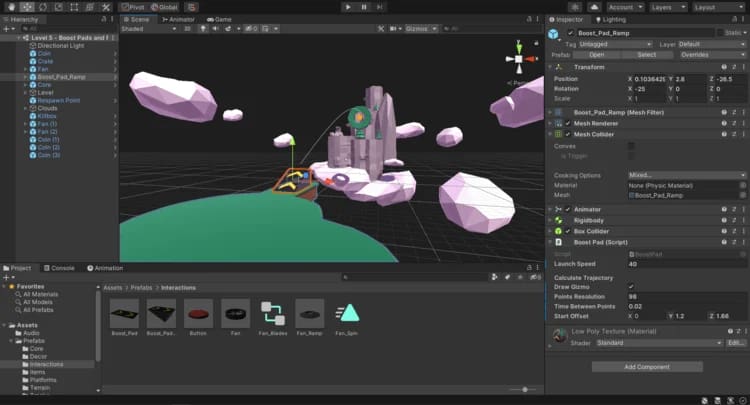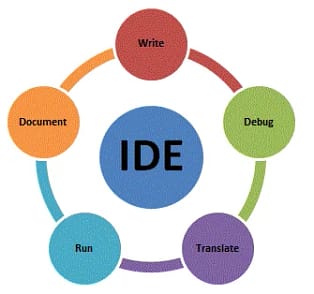In the dynamic world of game development, Unity is a powerhouse, enabling developers to create engaging and immersive games. This blog is a comprehensive guide to Unity, exploring its evolution, key features, scripting capabilities, graphics rendering, and more.
Whether you’re a seasoned developer or a beginner, join us on this journey to unlock the potential of Unity. If you wanna learn unity then you can learn complete unity here. But to download it click download.

A Brief History of Unity
Before diving into the technical aspects, let’s look at the roots of Unity. From its inception to becoming a leading game development engine, Unity has an interesting history that has shaped its current prominence.
The one of main reasons for its popularity is that it is best for beginners. It is always suggested that you start with unity. It was designed in 2005 and it was basically for Mac. But as it became popular it was made, to support different operating systems.
Key Features of Unity
Cross-Platform Development
One of Unity’s standout features is its ability to facilitate cross-platform development. Allowing developers to seamlessly reach a wider audience. We will examine the strategies and tools Unity provides for multi-platform game deployment.
Rich Asset Store
Unity’s Asset Store is a treasure box for developers, offering a vast collection of assets, plugins, and tools. Learn how to navigate and use the Asset Store to enhance your game development workflow.
Powerful graphics rendering
Graphics are one of the most important things in game development. By exploring Unity’s powerful graphics rendering capabilities, from shader basics to advanced lighting techniques, you will come to know about the real potential of Unity that it holds inside.
Physics Engine
A powerful physics engine is required to create realistic and dynamic movements within the game. Unity uses a very powerful and popular physics engine that is based on NVIDIA’s PhysX 3.4. This has a simple and user-friendly interface that will not confuse you very much.

Script in Unity
Introduction to C# in Unity
Understanding the role of C# in Unity scripting and why it is the language, I mean of C#, is a choice of many developers is very important. We’ll cover the basics and highlight its benefits for game development.
Basic Concepts of Scripting
The basic scripting concepts involve variables, functions, and control flow. Developing a solid understanding of C# syntax and structure enables us to start writing your scripts. The main reason, that c# is often used for game development is that it is the most popular and one of the best programming languages for game development.
Event Handling and Delegates
Events and delegates are powerful tools for managing interactions in a coalition. Learning how to implement event handling and delegates to create responsive and dynamic gameplay will help us in making awesome games.
Unity in the Game Development IndustrySuccess stories
Discover the success stories of game developers who have achieved remarkable feats with Unity. From indie developers to AAA studios, Unity has been a catalyst for groundbreaking games. This is why it is suggested that if you are a beginner then use Unity.
Popular Games Created with Unity.
The popular games created by Unity involve Fall Guys, Rust, Cuphead, Risk of Rain, Cities: Skylines, Hearthstone, and many others. From this, you can easily understand the power.
Disadvantages:
The biggest disadvantage of Unity is that unlike Unreal engine it does come with pre-made templates. thus you have to do all the work from scratch. Thus this gonna increase the total time spent on each project. Second, and another big disadvantage that will always be faced is memory consumption.
Unity consumes a lot of memories and you can do anything for it. Another big disadvantage is that making large-scale projects on unity is difficult. Especially controlling workflow for Android devices will iritate confuse you very much.
FAQS:
Here are some of the major questions people normally ask about Unity.
1. What is the power of unity, and why is it important?
The power of unity refers to the collective strength and synergy that emerges when individuals or groups come together in harmony towards a common purpose.
It’s important because it amplifies efforts, fosters cooperation, and enables the achievement of goals that might be impossible to attain individually.
2. How does unity contribute to achieving common goals and objectives?
Unity promotes collaboration, shared resources, and a sense of collective responsibility, which are essential ingredients for success. When people work together towards a shared objective, they can leverage their diverse skills, perspectives, and resources to overcome obstacles and achieve greater results.
3. What are some examples of the impact of unity in history or current events?
Examples include the Civil Rights Movement in the United States, where unity among diverse communities led to significant social and legislative changes.
Similarly, global initiatives like the Paris Agreement on climate change demonstrate the power of unity among nations to address pressing issues facing humanity.
4. How can individuals and groups foster unity within their communities or organizations?
They can foster unity by promoting inclusivity, communication, and empathy. Encouraging dialogue, respecting diverse perspectives, and actively addressing conflicts or misunderstandings can help build trust and solidarity among members.
5. What challenges might arise in maintaining unity, and how can they be addressed?
Challenges such as conflicting interests, communication barriers, and interpersonal conflicts can threaten unity.
Addressing these challenges requires open dialogue, conflict resolution skills, and a commitment to common goals. Establishing clear channels for communication and promoting mutual respect are also essential.
6. What are the benefits of promoting unity across diverse backgrounds, cultures, and perspectives?
Promoting unity across diversity fosters innovation, resilience, and social cohesion. Embracing diverse perspectives enriches problem-solving processes, strengthens community bonds, and promotes a sense of belonging for all members. Ultimately, it leads to more inclusive and sustainable solutions to complex challenges.
Conclusion:
As we wrap up this comprehensive guide to Unity, consider the knowledge gained and the potential that Unity holds for your game development efforts. Whether you’re a hobbyist, an indie developer, or part of a major studio, Unity opens the door to endless possibilities in the ever-evolving world of gaming. But keep the major disadvantages in mind before moving further.



